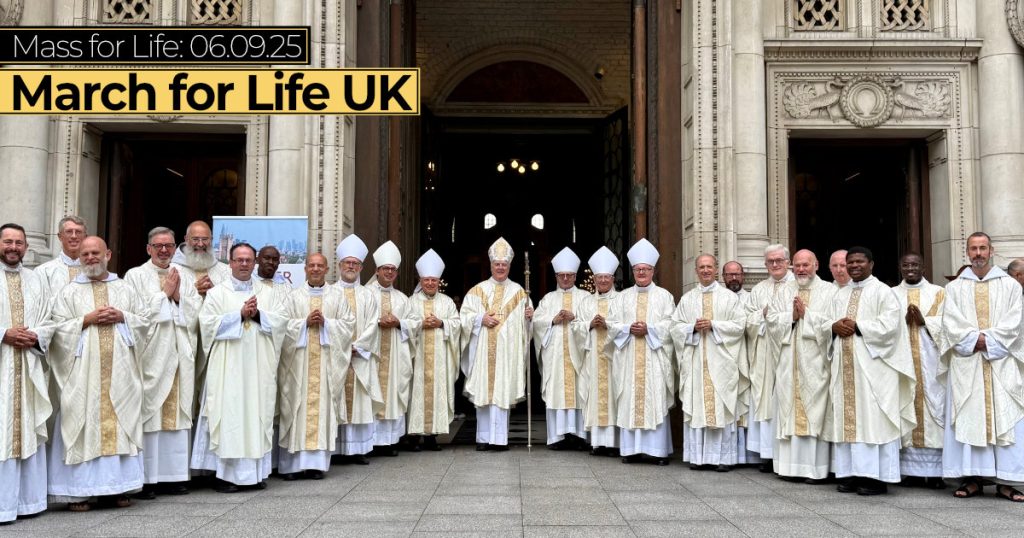
Homily – March for Life UK, Westminster Cathedral 2025
Colossians 1:21-23
Ps 54(53):3-4. 6, 8. ℟6a
Luke 6:1-5
A dad once told me about his son, a little boy of five or six, who had just found out that his mum was expecting a baby. He was so excited that every evening he would talk to the baby through his mother’s tummy: “Hello baby, I’m your big brother. I can’t wait to meet you. I love you already.”
But there were complications, and tragically the baby was lost. The boy was inconsolable. Through his tears he cried, “But I already loved him. Didn’t my love count?”
That cry says everything. Didn’t my love count? Even a small child knows that life in the womb is real, precious, and to be loved. Before the world names it, before society values it, before anyone celebrates it, that life is already worthy of love.
We are made to love life, to protect it, to welcome it. And yet our culture so often does the opposite. It chooses fear over hope, convenience over sacrifice, silence over witness.
That is why this Cathedral is full today. That is why thousands will walk the streets of London this afternoon. We are here to say, gently but firmly, that life matters. That every life is gift. That every life counts.
St Paul’s words this morning go straight to the heart: “You, who were once alienated, he has now reconciled in his body of flesh by his death, in order to present you holy and blameless and above reproach before him.”
The pro-life movement is not a club for the flawless. It is not a gathering of the sinless, or of the “we’re better than you” brigade. It is a movement of the reconciled, people who know what mercy feels like and want to share that mercy with others.
Think about where you have received mercy, and let that be your starting point. Our witness is not mostly about argument, still less about condemnation. Our first word is always mercy. Among us today are people who carry the pain of abortion in their own lives. The task is not to judge, but to accompany, to assure them that Christ, because he is Christ, still calls them “holy and blameless” in his mercy.
And because we know mercy, we cannot turn away from the most vulnerable:
- the unborn child
- the frightened mother
- the elderly tempted by despair
- the disabled whose dignity is dismissed
- the teenager who thinks life has no purpose
Reconciled people become reconcilers. Forgiven people become protectors. Loved people become lovers of life.
In the Gospel, Jesus is accused of breaking the Sabbath because his disciples plucked corn to eat. The Pharisees wanted the law to be about rules and restrictions. But Jesus reminds them that God’s law is always about life, about compassion and freedom. And then he says: “The Son of Man is Lord of the Sabbath.”
Our society has its own laws. Abortion is legal. Assisted dying is being debated. Many think that because something is lawful, it must also be good. But the Gospel reminds us: not everything lawful is holy. Only Christ is Lord. Not convenience, not economics, not fear. Only Christ.
That is why we’re walking today. Not to tear down, not to shout, but to bear witness that the Lord of life is still Lord in our world.
Our responsorial psalm gave us the perfect refrain for the March: “Behold, I have God for my help.” Eight syllables, just right to walk to.
It is the cry of the mother who thinks she cannot cope. It is the cry of the father tempted to run away. It is the cry of the elderly person who feels like a burden. And it must be our cry too, because we cannot defend life on our own. The challenges are too great, the wounds too deep, the culture too noisy. Yet “Behold, I have God for my help.”
In this Jubilee Year of Hope, the March for Life is exactly that: a proclamation of hope. The greatest sign of hope is a child in the womb. That tiny flutter of life, hidden and fragile, proclaims that the future is possible.
This year’s March has the theme “Human rights for all humans.” It sounds obvious, doesn’t it? Yet how quickly our world forgets. Today we remind society that the smallest human being has the same dignity as the strongest, that the most hidden has the same worth as the most powerful.
And what a day it will be. Many will go on from here to the Emmanuel Centre for LifeFest: stalls, talks, face-painting, T-shirt printing, crafts for children, music, conversation. A family day, a joyful celebration of life.
It is not a militant gathering. It is not fuelled by anger. As one commentator said: “When people see the March, they realise, this is the side of joy. This is the side of celebration. This is the side of hope.”
We are joined this year not only by seven Catholic bishops and clergy from across Britain, but by Anglican bishops, evangelical pastors, and other Christian leaders. Their presence tells us something: this is not the mission of one group, but of all who believe in the sanctity of life.
I read about a woman who had planned an abortion, but on the day of the March she saw families walking through London, carrying balloons, singing hymns, smiling with joy. She thought: “Which side would I rather belong to, the side of despair or the side of joy?” She chose life.
Or the parish where people collected baby clothes for the local crisis centre. A young woman said: “I saw the little clothes and I realised someone believed my baby mattered.” She kept her child.
That is what today is about: planting seeds of hope.
But here is the challenge. If our words say “choose life” but our parishes are not ready to help a mother in distress, then our witness is incomplete. If we say “life is sacred” but we ignore the lonely elderly person, our witness is inconsistent. If we speak about the unborn but never open our homes to adoption or fostering or even simply open to the stranger, then our witness is not yet the full Gospel.
Marching is powerful. But living mercy every day is even more powerful.
St Augustine once preached: “Do not despair: one who has promised is faithful, and he does not deceive. Place your hope in him, and you will not be overcome.”
So let that be our spirit today. Remember that little boy’s cry: “Didn’t my love count?” Today we answer him. Yes, your love counts. Yes, every life counts. Yes, in Christ every human being is known, cherished, and destined for glory. Every life matters. Every life is gift. Every life counts.


